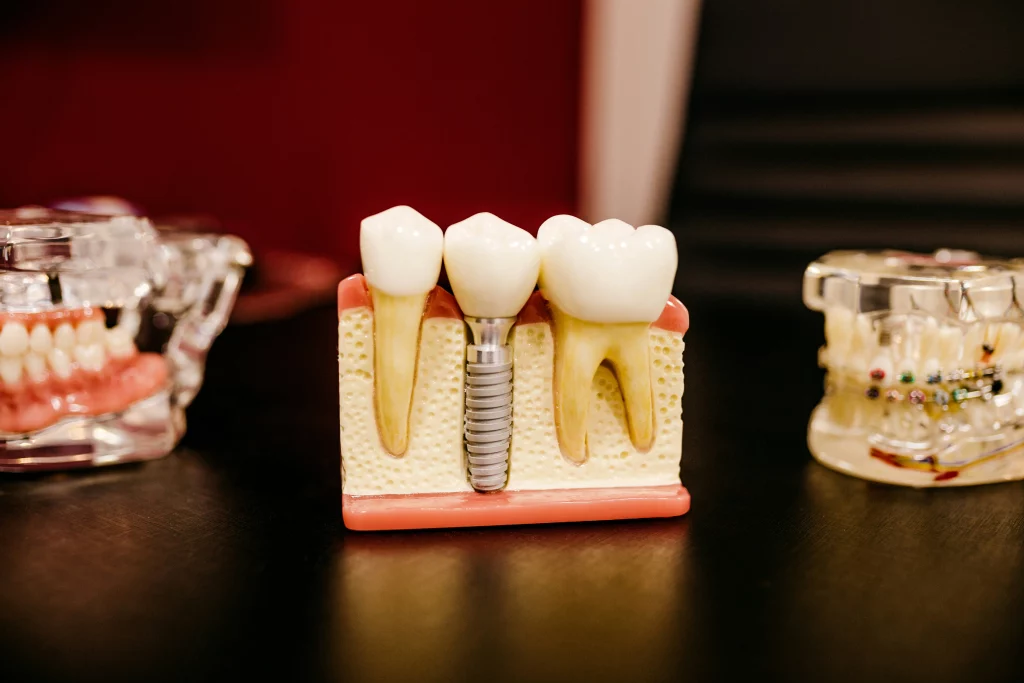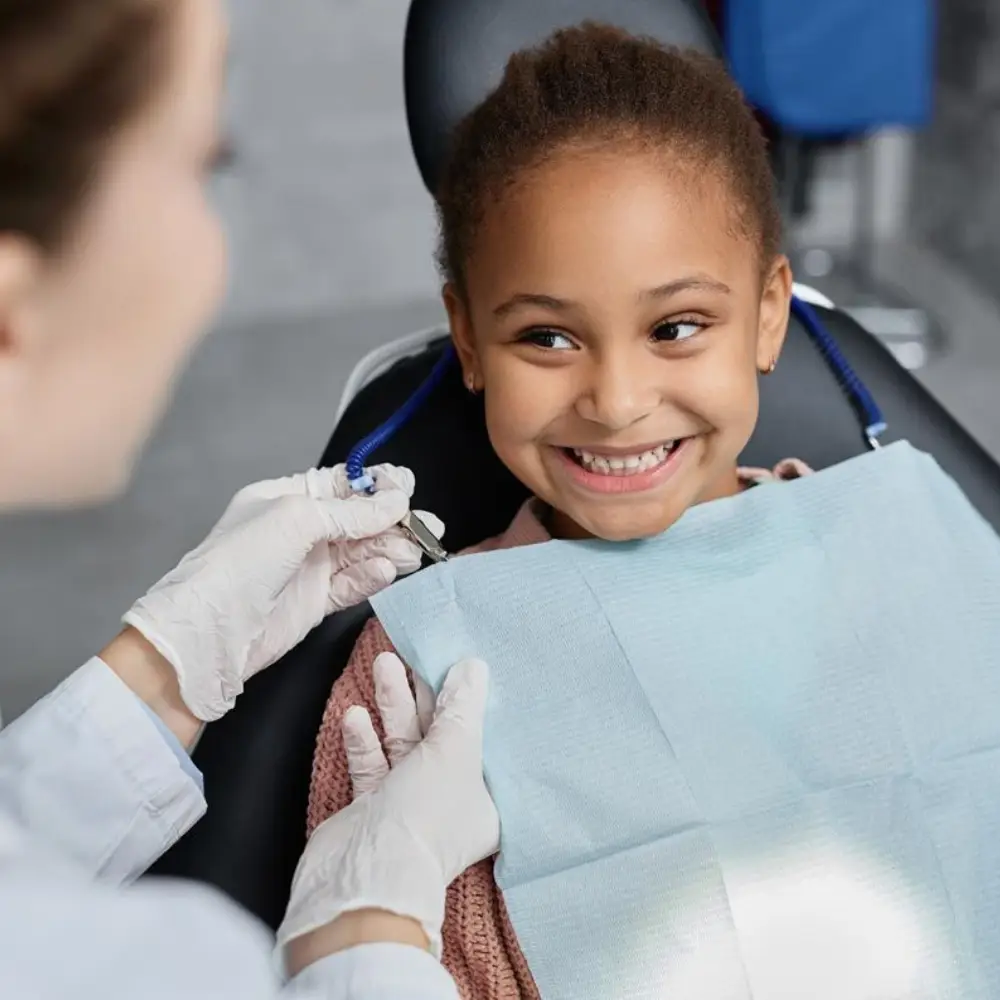Dental implants have become an essential solution for athletes looking to restore lost or damaged teeth while maintaining peak performance. Sports-related accidents can result in chipped, broken, or missing teeth, and traditional dentures often fall short when it comes to the demands of an active lifestyle. Unlike removable options, dental implants provide a permanent and secure solution that functions just like natural teeth, offering both strength and stability during high-impact activities. For athletes, this means they can continue training, competing, and performing with confidence, without worrying about slippage or discomfort.
Additionally, implants are aesthetically pleasing, blending seamlessly with the natural smile, and with proper care, they can last a lifetime. Strategic planning and professional guidance ensure that implants are tailored to each athlete’s needs, providing durability, functionality, and long-term oral health even in the most demanding sports environments.
Why Athletes Consider Dental Implants

For athletes, oral health is about more than just appearance, it’s about performance, comfort, and confidence on and off the field. Losing a tooth due to a sports injury can affect chewing, speaking, and even overall oral function, potentially impacting training and competition. While there are several options for replacing missing teeth, dental implants have emerged as a preferred solution for athletes because they offer durability, stability, and a natural look. By mimicking the function of real teeth, implants allow athletes to maintain peak performance while protecting long-term oral health.
Sports-Related Tooth Loss and Permanent Solutions
Athletes across a wide range of sports from football and hockey to gymnastics and martial arts face a higher risk of dental injuries due to collisions, falls, or impacts. Even a single blow can lead to tooth loss, affecting not just appearance but also essential functions like chewing, speaking, and overall oral health. Dental implants offer a long-term solution by replacing both the tooth root and crown, providing stability and functionality that closely mimics natural teeth.
Unlike removable dentures, which can shift or slip during activity, implants integrate directly with the jawbone, ensuring they remain secure even during rigorous training or competitive events. This stability allows athletes to perform at their best without worrying about discomfort or compromised oral function, making implants a reliable choice for those with active lifestyles.
How Implants Improve Function and Confidence in Athletes
Beyond appearance, dental implants restore full chewing efficiency, enabling athletes to maintain proper nutrition and energy levels both essential for peak performance. For those in high-visibility roles, such as professional sports, fitness competitions, or public performances, confidence in one’s smile is equally important. Dental implants provide a secure, natural-looking solution, allowing athletes to speak, smile, and eat without hesitation. Knowing their teeth are stable and reliable helps reduce stress and distractions, so athletes can fully concentrate on training, competition, and recovery. By combining functionality with aesthetics, dental implants support both performance and self-assurance, making them a preferred choice for those leading active and demanding lifestyles.
Impact Protection: Why Implants Outperform Dentures
Unlike dentures, which can shift, slip, or come loose during physical activity, dental implants are anchored directly into the jawbone, providing unmatched stability. This secure foundation minimizes the risk of further injury or discomfort during contact sports, allowing athletes to perform confidently without hesitation. In addition to stability, implants help maintain proper bite alignment, ensuring that chewing forces are evenly distributed across the teeth. This prevents jaw strain, reduces wear on surrounding teeth, and supports overall oral health factors that can directly impact athletic performance. By combining durability, functionality, and comfort, dental implants offer athletes a reliable solution for both everyday life and high-intensity sports.
Safety of Dental Implants in Contact Sports
For athletes participating in contact sports, safety is a top priority not just on the field, but also for their teeth. Dental implants are designed to withstand everyday use and most physical activities, providing a secure and reliable alternative to removable dentures. With proper placement, care, and protective gear, implants can remain stable even during high-impact collisions. Understanding how implants perform in sports settings helps athletes make informed decisions about their oral health while maintaining peak performance.
Can Dental Implants Break During High-Impact Activities?
Dental implants are engineered to withstand significant force, making them a durable solution for active athletes, but it’s important to remember that no dental restoration is completely indestructible. Modern implant materials, such as titanium and zirconia, offer exceptional strength, longevity, and resistance to fracture. When implants are properly placed and maintained, athletes can safely return to high-impact sports while maintaining confidence in their oral health. To further protect the implants and surrounding teeth, custom-fitted mouthguards are highly recommended, providing an extra layer of safety during games and practices. With the right combination of professional care and protective equipment, athletes can enjoy both peak performance and long-term dental stability.
Custom Mouthguards for Implant Protection
For athletes with dental implants, wearing a mouthguard is an essential part of protecting their investment and overall oral health. Custom-fitted guards are designed to distribute impact evenly across the jaw, safeguarding both natural teeth and implants from potential damage during sports activities. These mouthguards are tailored to accommodate the exact position of the implants, ensuring a comfortable fit that does not interfere with bite alignment or performance. As teeth and implants gradually adjust over time, regular assessments of the mouthguard are important to maintain optimal protection and comfort. By combining implants with properly fitted protective gear, athletes can stay active and confident while minimizing the risk of injury.
Recovery Time and Returning to Sports After Surgery
Recovery from dental implant surgery can vary depending on the number of implants placed and each individual’s healing rate. In most cases, athletes can return to non-contact activities within a few days, while resuming full-contact sports usually takes a few weeks, after the implant site has fully integrated with the jawbone. Following post-operative instructions such as avoiding trauma, adhering to a soft-food diet initially, and maintaining diligent oral hygiene is critical to ensure long-term implant success.
Coordination between the dentist and the athlete’s trainer or coach can further help manage a safe and gradual return to active sports. By respecting healing timelines and using protective measures like custom mouthguards, athletes can regain full function, maintain performance, and enjoy the long-term benefits of their dental implants.
Choosing the Right Dental Implant for an Active Lifestyle
Selecting the right dental implant is especially important for athletes and active individuals who place extra demands on their teeth. The ideal implant should provide strength, stability, and durability while blending seamlessly with natural teeth. Factors such as material choice, placement technique, and coordination with protective gear can all influence long-term success. Understanding these considerations helps athletes make informed decisions, ensuring their smile remains both functional and resilient throughout an active lifestyle.
Single-Tooth vs. Full Mouth Dental Implants for Athletes
Athletes may require anything from a single implant to a full-arch restoration, depending on the extent of dental injury. Single-tooth implants are an excellent solution for isolated tooth loss, offering precise function, natural appearance, and stability that allows athletes to chew, speak, and perform without disruption. For those who have experienced more extensive trauma or multiple missing teeth, full-mouth restorations such as the All-on-4 system provide a comprehensive solution, restoring both function and aesthetics across the entire dental arch.
Choosing the right approach requires a thorough evaluation with a dental professional, who can assess factors like bone density, oral health, and the individual’s activity level. By tailoring the treatment to an athlete’s specific needs, implants can deliver long-lasting performance, comfort, and confidence, even in demanding sports environments.
Material Options for Durability and Strength
Titanium implants are widely recognized for their exceptional strength, biocompatibility, and long-term reliability, making them a trusted choice for athletes who need durable dental solutions. Zirconia implants, on the other hand, provide a strong alternative that also offers a natural, tooth-like appearance, appealing to those who prioritize aesthetics alongside function. Both materials are designed to withstand the high biting forces and daily wear associated with rigorous athletic activity, ensuring stability and comfort during performance. Choosing the right material involves considering individual factors such as jawbone structure, oral health, cosmetic preferences, and recommendations from an experienced dentist. By selecting the appropriate implant material, athletes can achieve a balance of strength, appearance, and long-lasting oral health tailored to their active lifestyle.
Implant Placement Techniques That Enhance Stability
Advanced implant placement techniques, such as guided surgery and strategic angulation, help ensure that implants are positioned for maximum stability and function. Proper placement promotes optimal bone integration, which is essential for long-term durability especially for athletes who subject their teeth to added stress during high-impact activities. In some cases, athletes may require bone grafting to strengthen the jaw and provide a solid foundation for the implants, enhancing both support and longevity. Precision in placement not only reduces the risk of complications but also contributes to proper bite alignment and comfort. By combining careful planning with advanced surgical techniques, dentists can help athletes achieve a durable, functional, and natural-looking smile that withstands the demands of an active lifestyle.
Long-Term Maintenance of Implants for Athletes
Maintaining dental implants is essential for long-term success, especially for athletes who place extra demands on their teeth. Proper care ensures that implants remain strong, functional, and visually natural, even under rigorous physical activity. Routine hygiene, regular dental check-ups, and protective measures help prevent complications and prolong the life of the implants. Understanding the key steps for implant maintenance allows athletes to stay confident in their smile while continuing to perform at their best.
Special Oral Care Routines for Sports Professionals
Maintaining dental implants requires careful attention, particularly for athletes who are frequently exposed to physical stress and the occasional impact or trauma. Consistent daily care, including thorough brushing and flossing, is essential to prevent plaque buildup and gum inflammation around the implant site. Using antiseptic rinses can further reduce the risk of infection and support healthy tissue integration. Athletes should also consider rinsing their mouths after practices, games, or exposure to shared equipment, minimizing bacteria that could compromise oral health. By following these routines diligently, athletes can preserve the integrity of their implants, protect surrounding teeth and gums, and ensure that their smile remains both functional and aesthetically pleasing over the long term.
Preventing Injuries Around Dental Implants
Even with dental implants, athletes need to remain vigilant to prevent trauma and protect their oral health. Wearing a properly fitted mouthguard during practices and competitions is essential, as it helps absorb impact and safeguard both natural teeth and implants. Avoiding high-risk behaviors, such as biting hard objects or engaging in unsafe play, further reduces the chance of damage. Coaches and athletic trainers can offer valuable guidance on protective equipment and safe techniques tailored to each sport. Additionally, athletes should perform regular self-checks for tenderness, swelling, or any signs of mobility around the implant. Promptly addressing any issues with a dental professional ensures long-term success, maintaining both the functionality and appearance of the implants while supporting peak athletic performance.
Regular Check-Ups for Implant Longevity
Routine dental visits are essential for monitoring the health and longevity of dental implants, particularly for athletes who place additional demands on their teeth. During these check-ups, dentists assess bone integration, evaluate the condition of surrounding soft tissues, and examine bite alignment to prevent potential complications. Scheduling visits every six months or as recommended by the dental professional helps identify early signs of wear, loosening, or other issues that could compromise implant stability. Regular professional care, combined with diligent at-home maintenance, significantly enhances the lifespan and functionality of implants. For athletes, this consistent monitoring ensures that their dental implants remain strong, reliable, and ready to support both everyday activities and peak performance in sports.
Frequently Asked Questions (FAQs)
1. Are dental implants safe for athletes in contact sports?
Yes, dental implants are safe and effective for athletes, even those participating in high-impact sports. When paired with properly fitted mouthguards, implants can absorb and withstand physical activity while providing stability comparable to natural teeth. Proper surgical placement is essential to ensure that the implants integrate securely with the jawbone and maintain long-term function. Following post-operative care instructions, including diligent oral hygiene and avoiding unnecessary trauma, helps reduce the risk of complications. Regular dental check-ups allow early detection of any issues, ensuring the implants remain strong and reliable. With the right combination of professional care, protective gear, and daily maintenance, athletes can enjoy both peak performance and lasting oral health.
2. Do dental implants require special protection during games?
While dental implants are strong and durable, wearing a custom-fitted mouthguard is highly recommended for athletes. Mouthguards help absorb and distribute impact forces evenly across the jaw, protecting both natural teeth and implants from potential trauma. A properly designed guard also maintains comfort and proper bite alignment, ensuring that performance is not compromised during sports activities. Regularly checking the fit and making adjustments as needed ensures that the mouthguard continues to provide effective protection as teeth and implants shift slightly over time. Combined with diligent care and preventive measures, this routine helps athletes maintain the integrity and longevity of their implants while staying active safely.
3. How long after implant surgery can I return to playing sports?
Recovery times after dental implant surgery can vary depending on the number of implants and individual healing rates. Many athletes are able to resume non-contact activities within just a few days, allowing them to maintain fitness and daily routines. Full-contact sports, however, typically require several weeks before it is safe to return, giving the implant sufficient time to integrate securely with the jawbone. Following the dentist’s post-operative guidelines including proper oral hygiene, dietary precautions, and avoiding trauma is essential to prevent complications and ensure long-term success. With careful adherence to recovery instructions, athletes can safely regain full function and confidence, maintaining both performance and the longevity of their implants.
4. What type of implant is most durable for athletes?
Titanium implants are widely regarded as one of the most durable options, thanks to their exceptional strength, flexibility, and biocompatibility. They integrate effectively with the jawbone, providing a stable and long-lasting foundation even under the stresses of high-impact sports. Zirconia implants, while also highly durable, offer the added benefit of a natural, tooth-like appearance, appealing to athletes who prioritize aesthetics alongside functionality. Choosing the right implant material depends on several factors, including individual anatomy, oral health, personal preferences, and the specific physical demands of the athlete’s sport. By carefully considering these factors with a dental professional, athletes can select an implant that balances strength, appearance, and long-term performance.
5. Can dental implants replace teeth lost in sports accidents?
Absolutely. Dental implants are a reliable and long-term solution for athletes who have lost teeth due to sports-related injuries. They restore full function, allowing individuals to chew, speak, and perform athletic activities without restriction, while also improving the appearance of the smile. Unlike removable options, implants integrate with the jawbone, providing stability comparable to natural teeth. With proper post-operative care, diligent oral hygiene, and protective measures such as custom mouthguards, dental implants can last for decades, offering both durability and confidence. For athletes, this combination of functionality, aesthetics, and longevity makes implants an ideal choice for maintaining performance and overall oral health.
Dental implants provide athletes with a permanent, reliable solution for sports-related tooth loss. They combine strength, stability, and aesthetics, enabling athletes to maintain peak performance without worrying about dental limitations. With proper protection, strategic placement, and ongoing care, implants offer a durable foundation that supports both health and confidence.
If you’re an athlete who has experienced tooth loss or is considering preventive measures, consulting with an experienced dental implant specialist is the next step. Schedule a personalized assessment to explore your options, learn about the most durable materials, and develop a care plan tailored to your active lifestyle. Protect your smile, enhance your performance, and enjoy the confidence that comes with strong, reliable dental implants.


